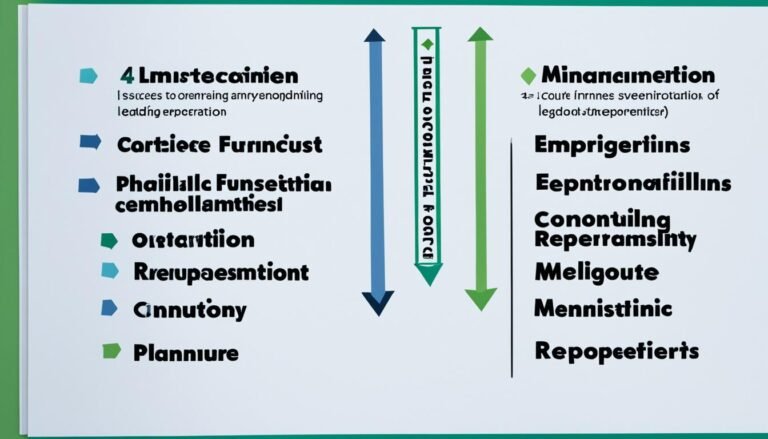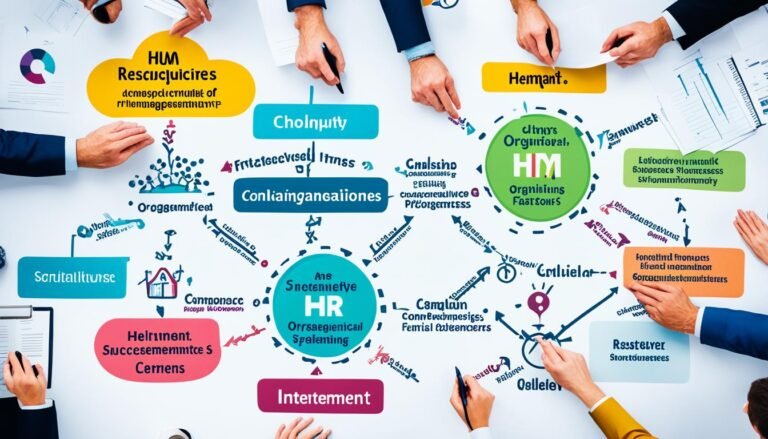What fundamentals should every project manager know?
Project management plays a big role in making companies successful. The Project Management Institute found that companies ahead in this area see a 30% boost in project success. This leads to more profits and happier customers. It shows how vital skilled project managers are.
Key Takeaways:
- Mastering project management fundamentals is essential for project success.
- Project managers should have the necessary skills, knowledge, and techniques.
- Clear objectives, effective communication, and realistic planning are crucial.
- Cost and risk management practices are vital in project management.
- Developing subject matter expertise and utilizing project management tools are beneficial.
The Importance of Project Managers
A project manager is key to any project’s success. They lead the project, coordinate with the team, and communicate with everyone involved. They also handle risks and make sure the project’s quality is top-notch.
Good project managers lead with a clear vision and inspire their teams. They create a space where everyone can share ideas freely. This boosts creativity and helps the project move forward.
They keep everyone in the loop, from clients to team members. This helps the project run smoothly because everyone knows what’s going on. They make sure communication is open at all times.
Project managers are always ready for challenges. They look out for anything that might go wrong. And, they come up with plans to deal with these issues before they cause a problem.
Project managers handle lots of tasks, from planning to making sure everything’s on schedule. They’re skilled at managing people and resources. This keeps the project on track and ensures it’s done well.
They create a strong team spirit. They encourage everyone to work together and support each other. This makes the team stronger and the project more successful.
When it comes to money, project managers are on top of things. They make sure the project stays within budget. They’re good at making financial decisions that help the project.
They have a deep understanding of their field. This helps them set high standards for the project. They check every detail to make sure it meets the project’s goals.
In the end, project managers are the heart of a successful project. They use their skills to lead, communicate, handle risks, and ensure quality. Thanks to them, projects reach their goals and satisfy everyone involved.
Well-Defined Project Objectives and Goals
Setting clear, realistic, and measurable project objectives and goals is key for success. These goals guide the project team. They make sure everyone is heading the right way. With these in place, project managers can chart a path to success with defined goals and checkpoints.
Clear goals help focus and clarity for the whole team. They act as a guide for making decisions and help in setting priorities and using resources. When goals are clear and easy to measure, it’s simpler to see how the project is doing. Plus, they let stakeholders know what to expect from the project.
“Setting clear goals is the first step towards turning the invisible into the visible.”
Realistic goals are crucial for a project to do well. They need to be possible to achieve within the given limits. This stops too high hopes and keeps the team enthusiastic. By reaching these smaller milestones, the team stays motivated during the project’s journey.
Measurable goals help managers keep an eye on progress. They use KPIs and metrics to check on the project’s health. This way, they can stay on top of any problems and make changes as needed.
Why Are Well-Defined Project Objectives and Goals Important?
Clear project goals give everyone a sense of purpose. They align efforts, reducing confusion, and boosting success odds. Such objectives also make communication easier. They help managers convey what the project is about and its goals to others.
Well-defined goals are the basis for successful project planning. They help set the project’s scope, define what to deliver, and assign resources. Knowing the project’s goals helps in creating a solid plan. This plan lays out how to reach the project’s goals smoothly.
In the end, clear project objectives and goals make projects better. They give project managers the right tools and guidance to lead the team successfully.
| Benefits of Well-Defined Project Objectives and Goals |
|---|
| Alignment and clarity for the project team |
| Effective communication with stakeholders |
| Realistic expectations and achievable milestones |
| Clear framework for project planning and execution |
| Tracking progress and evaluating project performance |
Having clear project goals is like having a map for success. It helps project managers lead their team to victory and keeps stakeholders informed. These goals act as a guide, ensuring the project stays on the right path. They also help managers make smart choices when adjustments are needed.
Clear Deliverables
Clear deliverables are a must in any project. They lay out the scope, guiding the team’s work. These results, products, or abilities show when a phase or project is done. Whether it’s a product or service, they help everyone know what to do. They also track progress and measure success.
Project deliverables are key for a project to do well. They are goals that let managers check how the project is doing. If needed, they can make changes. With these clear goals, everyone knows what to aim for.
Clear goals also manage what people expect from the project. Managers can be straight about what and when things will happen. This builds trust and helps people work together better during the whole project.
Having clear goals makes running a project smoother. Breaking a project into parts with set goals for each part helps plan better. It makes tasks easier to handle, sets times for them, and helps decide what to do first.
“Clear deliverables provide the project team with a shared understanding of the end goal and create a common language for discussing progress and results.” – John Smith, Project Manager
Project Phases and Process
A project has different phases, each needing its own set of goals. These steps from start to finish give the project a logical order. It makes sure things move forward smoothly.
The steps a project takes can change based on how it’s run. But, starting, planning, doing, checking on progress, and ending are common steps. Each step has its special goals. For instance, at the start you’d have project plans, but at the end, you’d have final reports.
The project process is about doing tasks in order to meet those steps. It helps handle resources and make sure the project’s goals are reached. A clear process and goals for each step help avoid problems and keep the project in check.
Having clear goals woven into the project’s steps makes managing it easier. It plays a big part in the project’s success.
| Benefits of Clear Deliverables | Impact |
|---|---|
| Defines project scope | Ensures all project activities are focused and aligned with objectives |
| Facilitates project planning | Aids in the development of realistic timelines and resource allocation |
| Enables progress tracking | Allows project managers to monitor milestones and measure success |
| Enhances stakeholder communication | Fosters transparency, trust, and collaboration |
| Provides a basis for evaluation | Enables assessment of project outcomes and identification of areas for improvement |
Verifiable Results
Verifiable means you can prove it’s true. In a project, it’s important to be able to check if goals are really met. Managers and those involved must be able to see the work meets set criteria or tests.
Verifiable results make everyone on the team responsible for their role. By measuring what’s done, managers can see who’s doing well and where to improve. This makes a project run better.
These results also show the project’s worth to others. By being clear on what the project will achieve, and then actually achieving it, managers build trust and a good reputation.
In the end, clear goals that can be proven are the heart of successful project management. They focus the team, keep things in order, and show everyone’s hard work.
Robust Strategy for Execution and Initiation
A successful project needs a strong plan from start to finish. This includes both how it begins and how it unfolds. We’ll look at how to kick off and run a project for top results.
Project Initiation:
The first part of any project is vital. It lays the groundwork for everything else. This step involves looking into if the project can really happen. You also need to create a business plan to see if it’s worth the effort. This helps everyone involved know if it’s a good idea or not. It also helps nail down what everyone should expect and hope to accomplish.
Another key point in starting a project is that first team meeting. In this meeting, the group meets with those involved in the project and the people it will help. They talk about what the project is, the goals, and who does what. This meeting is key to starting the project right, so everyone is on the same page.
Remember: To start a project right, do your homework. Make sure everyone knows what to expect and what you all want to achieve.
Project Implementation:
After starting things off, it’s time to put plans into action. This involves turning the project’s blueprint into something real. Project managers make sure everything is clearly laid out. This includes what needs to be done, when, by who, and what’s needed to get it done.
Milestones in the project’s journey are really important. They help check in on how things are going and if you’re headed in the right direction. By setting these goals, you can see how far you’ve come, spot problems early, and tweak things to keep on track.
Projects often have to change as they go. When this happens, a good process for making changes without wrecking everything is vital. Managing these changes well helps keep up the good work.
Keep in mind: Making a project happen is all about careful planning, hitting milestones, and smoothly managing any tweaks.
| Key Considerations for Project Execution and Initiation | Description |
|---|---|
| Feasibility Reports | Assess the viability of the project through comprehensive feasibility reports. |
| Project Kickoff Meeting | Bring together the project team, stakeholders, and client representatives to introduce the project and align expectations. |
| Project Stakeholders | Involve project stakeholders in the initiation phase to ensure alignment and gather valuable inputs. |
| Project Plan and Vision | Document and communicate the project plan and vision to guide the team throughout implementation. |
| Project Milestones | Define clear milestones to track progress, measure success, and identify potential risks. |
| Project Amendments | Establish a process to manage changes to the project plan effectively and minimize disruption. |
Getting the start and follow-through right is critical for any project. A good start and a solid plan help everyone work together well. They also make sure the project reaches its goals. With a detailed plan, clear milestones, and a process to handle changes, projects can stay on course. This guides the team through the twists and turns of making ideas into solid results.
Command Over Tools and Software
These days, knowing how to use tools and software for project management is more important than ever. Using the right tools can make projects run smoother, help get things done faster, and make the final results better.
Project managers have a lot of tools to choose from. They range from tools to plan what your team will work on visually, to ones that let everyone see and add to a shared calendar. We’ll look at some key tools and software that make managing projects easier:
Visual Resource Planning Tools
Visual resource planning tools let project managers see all team resources at a glance. They can assign tasks, balance workloads, and spot resource issues easily. These tools are user-friendly, making resource management a breeze for better productivity and project success.
Shared Online Calendars
Shared online calendars are a go-to for project teams. They centralize schedules, giving everyone a clear view of project dates and goals. With real-time updates and alerts, team members can coordinate better and stay on the same page.
Task Management Software
Task management software helps project managers assign and track tasks efficiently. It lets teams set task priorities and keep an eye on progress. This software drives teamwork, ensures tasks are done on time, and keeps projects moving forward smoothly.
Using project management tools and software can make managing projects easier and improve results. It’s crucial for project managers to know these tools well and keep learning about new ones. This ensures they have what they need to succeed in their roles.
Popular Project Management Tools and Software
| Tool/Software | Description |
|---|---|
| Asana | A versatile project management tool that enables teams to manage projects, tasks, and deadlines efficiently. |
| Jira | A robust software development tool that allows teams to manage and track agile projects. |
| Trello | A visual collaboration tool that facilitates task management and enhances team productivity. |
| Microsoft Project | An industry-standard project management software that offers comprehensive project planning and scheduling capabilities. |
| Basecamp | An all-in-one project management tool that facilitates communication, file sharing, task management, and scheduling. |
Subject Matter Expertise
A special quality that makes project managers stand out is their deep knowledge. They not only have skills in managing projects but also understand the tools and tech used within them. This know-how lets them smoothly handle the challenges projects throw at them.
Knowing a lot about the project’s tech helps project managers talk to others involved in the project. This makes it easier to figure out what the project needs. They can discuss with suppliers and clients, making sure deadlines and budgets are realistic.
Knowledge plays a big part in keeping the project team talking clearly. Project managers can explain tech details to everyone. They also work better with the technical experts, using their knowledge to solve problems and succeed.
For example, think of a project manager running a website building project. They need to understand coding, web tools, and tech to get the project done right. This deep knowledge helps them explain what’s needed, see risks, and find solutions. Project managers work better with their team when they know their stuff, leading to project success.
Now, project managers don’t need to know every tiny detail. But a strong understanding of the tech being used in the project is key. It helps them handle project challenges, make smart choices, and talk effectively with everyone working on the project. With both project management knowledge and tech expertise, project managers can guide their teams to success.
The Role of Subject Matter Expertise
Subject matter expertise is crucial for project managers. It helps them do several important things:
- They can negotiate project details better, making sure everyone’s goals line up.
- With good tech understanding, they can set up realistic project milestones and meet them.
- Knowing the tech allows them to make precise guesses on project costs and times, which is key for planning well.
- They can explain tech aspects clearly, which makes working together on the project smoother.
Overall, knowing a lot about the project’s tech is just as important as project management skills. It boosts a project manager’s ability to successfully lead and complete complex projects.

Effective Communication
Project managers need strong communication skills. We know how vital it is to talk and share information for projects to be successful. A big part of our job includes interacting with many people, like team members and clients. This ensures everyone knows what to do and aims for the same goals.
Open and honest conversations are at the core of good project management. When we are clear and truthful, we earn the trust of the team and stakeholders. This trust leads to better choices, solving problems easier, and fixing issues before they become big.
Every step of managing a project requires good communication. We start by telling everyone what we want to achieve. Then, we work together to make a plan and adapt as needed.
“Effective communication is not just about conveying information; it’s about ensuring that the message is understood and interpreted correctly by all parties involved.”
Being able to talk openly helps us handle risks, solve conflicts, and make smart choices quickly. But talking is just one part. We also need to listen well and understand others’ points of view. These skills make our work more collaborative and welcoming for everyone involved.
Benefits of Effective Communication:
Putting communication first in project management brings many advantages:
- Improved project coordination and collaboration
- Enhanced stakeholder engagement and satisfaction
- Enhanced clarity in project objectives and goals
- Proactive issue identification and resolution
- Increased team productivity and efficiency
Good communication also prevents mistakes and misunderstandings. It lets us keep everyone in the loop with updates, managing their expectations.
As project managers, we see the value of good communication in every project. By making communication a top priority, we build strong relationships, involve everyone, and keep the project going smoothly. This increases our chances of achieving success.
| Key Elements of Effective Communication | Benefits |
|---|---|
| Active listening and empathy | Improved understanding and trust |
| Clear and concise messaging | Prevention of misunderstandings |
| Regular and transparent updates | Increased stakeholder satisfaction |
| Adaptability to different communication styles | Enhanced collaboration and teamwork |
Realistic Project Planning and Management
Realistic project planning and management are key to any project’s success. Project managers set goals that are realistic and work with what’s available. They must balance what needs to be done, when, and with what’s on hand.
Creating a real project timeline helps keep things on track. It looks at what’s needed, what the team can do, and the resources ready. This way, the project is more likely to succeed.
Project managers mark clear milestones as the project moves forward. These are like checkpoints to review progress and adjust the course if needed. Milestones are critical for keeping the project in line with its goals.
They also need to handle deadlines well for timely results. It’s about setting dates that match what the project aims to achieve. Setting the right deadlines avoids delays and meets everyone’s expectations.
Managing resources is also a big part of this. Project managers must use tools, skills, and support wisely. Doing this keeps the project team working effectively and avoids wasting resources.
Benefits of Realistic Project Planning and Management
- Improved project performance: Realistic planning helps teams meet deadlines and satisfy clients.
- Enhanced team morale: Knowing what’s expected, and when, boosts worker morale and performance.
- Better client satisfaction: Realistic planning sets clear expectations with clients, leading to happier outcomes.
- Optimized resource utilization: Effective resource management avoids stress on team members and ensures steady progress.
In short, good project planning is fundamental. It involves setting reachable goals, working with the team’s capabilities, and using resources wisely. With these in place, projects run smoother and achieve better results.
Cost Management
Managing costs is key in project management. This includes planning, estimating, and controlling costs. It’s essential throughout the project’s life.
Resource planning is critical for managing costs. It involves finding and using resources efficiently. This helps cut down on unnecessary spending.
Estimating costs accurately is vital too. Project managers use past data and techniques for this. It lets stakeholders know what to expect in terms of costs.
“A budget is telling your money where to go instead of wondering where it went.” – Dave Ramsey
Budgets allocate resources for project tasks. They stop overspending and keep the project financially in check. This is proven to keep projects on budget.
Cost control keeps a close eye on spending. It involves looking over financial reports. Correcting spending issues early on maintains financial health.
The Importance of Effective Cost Management
Good cost management is crucial for a project’s success. It keeps the project in budget and reduces risks. It also builds trust with stakeholders.
- Ensure the project stays within the allocated budget and resources
- Identify cost-saving opportunities
- Minimize financial risks
- Make data-driven decisions based on accurate cost information
- Improve stakeholder confidence and trust
- Deliver the project on time and within budget
Using solid cost management, project managers can handle financial challenges. It helps them make the most of project resources for success.
Case Study: Cost Management in Action
| Project | Planned Budget | Actual Costs | Variance |
|---|---|---|---|
| Website Development | $50,000 | $48,500 | -$1,500 |
| Marketing Campaign | $100,000 | $95,000 | -$5,000 |
| Product Launch | $200,000 | $202,500 | $2,500 |
In a case study, three projects showed different cost management results. The budgets and actual costs tell us how well cost management worked.
The website development stayed under budget. This shows good cost control. The marketing campaign went over budget due to surprises. The product launch spent more than planned, suggesting a need for tighter cost management.
This analysis helps project managers do better in the next project. They can learn from these experiences to improve cost management.
Risk Management
Risk management is key in project management. It means finding, thinking about, and reacting to risks that might hurt the project. This helps keep the project’s success safe.
Handling project risks happens all through the project’s life. It includes finding and studying risks, making plans for them, and keeping an eye on them.
Spotting risks is the first step. You can do this by talking things over, looking at past data, and asking experts. This makes it easier for project managers to plan how to deal with or avoid risks.
Next is understanding a risk’s possible impact and chance of happening. This lets project managers know which risks to worry about most. It helps them focus on the most important risks first.
After knowing the risks, it’s time to make plans to handle them. You might try to lessen the risk’s effect or try to steer clear of it entirely. The plans depend on what each risk is about.
But, the work doesn’t stop there. As the project goes on, it’s important to keep an eye on risks. This way, new risks are caught early, and plans can be changed when needed. Keeping watch helps keep the project safe.
Good risk management is vital for a project’s triumph. It lets project managers make smart choices and deal with problems early. By fitting risk management into the project at every stage, managers can handle unknowns better and stop big issues.
Conclusion
Learning project management basics is key to project success. Project leaders need skills and knowledge to manage well. They must set clear goals, get results, and plan carefully. They should also be good at talking with others and handling costs plus risks.
Knowing these basics helps project managers overcome challenges. Good communication builds teamwork and keeps everyone informed. Realistic planning ensures things happen when they should. Managing costs well and avoiding risks are also important for the project’s health.
Using these skills makes projects more likely to succeed. Effective communication, careful planning, and managing money and risks are crucial. Project managers need these fundamental principles to lead successful projects.








